The Limits of the Political
 I am a newly converted fan to the 3rd sector and the thousands of groups (church groups also) and their volunteers who actually accomplish good works. I imagine many of these don’t consider their work political, but rather social in nature. Here one could accuse these groups of a lack of political sophistication and critique of capitalism that the above mentioned groups most certainly possess.
I am a newly converted fan to the 3rd sector and the thousands of groups (church groups also) and their volunteers who actually accomplish good works. I imagine many of these don’t consider their work political, but rather social in nature. Here one could accuse these groups of a lack of political sophistication and critique of capitalism that the above mentioned groups most certainly possess.Social critics and their numerous books and essays fall into a separate category. Writing is art and we do need to make use of the word. The “boss” has millions of words at his disposal from political pundits, to advertising and to the mass-media news and their always fair and balanced reporting. But when do words become action? How can these important ideas be put into practice? How can they be organised?
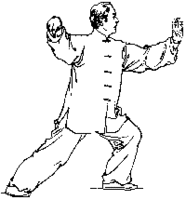 I’ve often asked in my work, in videos, and theatre: what is it about the human condition that makes us unable to realise the beautiful ideas that humanity has so sublimely expressed in art, music and literature? Why can’t we get it together as a species? We live a lie, a hypocrisy where we tout, plug, and peddle great promises but as soon as they are uttered another bombs goes off, another war starts, another child dies of hunger, another executioner inserts the syringe. Why this great divide between ideas and life? Is a political solution even enough to resolve the great human dilemmas, to alleviate what haunts the human spirit? And art for art’s sake seems be a pathetic type of intellectual, post-modernist masturbation, akin to new age ideologies.
I’ve often asked in my work, in videos, and theatre: what is it about the human condition that makes us unable to realise the beautiful ideas that humanity has so sublimely expressed in art, music and literature? Why can’t we get it together as a species? We live a lie, a hypocrisy where we tout, plug, and peddle great promises but as soon as they are uttered another bombs goes off, another war starts, another child dies of hunger, another executioner inserts the syringe. Why this great divide between ideas and life? Is a political solution even enough to resolve the great human dilemmas, to alleviate what haunts the human spirit? And art for art’s sake seems be a pathetic type of intellectual, post-modernist masturbation, akin to new age ideologies.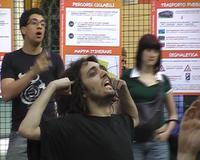 “We are born into a world where alienation awaits us. We are potentially men but are in an alienated state, and this state is not simply a natural system. Alienation as our present destiny is achieved only by outrageous violence perpetuated by human beings on human beings.”
“We are born into a world where alienation awaits us. We are potentially men but are in an alienated state, and this state is not simply a natural system. Alienation as our present destiny is achieved only by outrageous violence perpetuated by human beings on human beings.”
“They are a playing a game. They are playing at not playing a game. If I show them I see, I shall break the rules and they will punish me. I must play their game, of not seeing the game.”
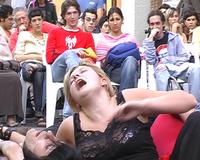
Visionaries, malcontents, criminals, tramps, iconoclasts and others who challenge our basic beliefs, who challenge our reality, who challenge this unnatural system- like the schizophrenic, the manic-depressives, the discontent and rebellious teens and the mad poets- these we can only trivialise, isolate, lock away, medicate. (Modern forms of crucifixion.)
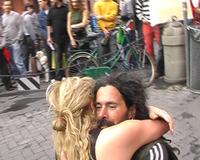
If the bombs can’t teach then how can the theatre? Julian Beck. What can theatre do that “politics” has been unable to do? Ameliorative theatre?
How? In the theatre we can create magic! We can return to the power, mystery and terror of the Now. Sacred time, space and body. And ecstasy: where do we find it in life? And yet is this political?
We can in the enclosed space of the spectacle (between beginning and end) experience joy and meaning while we speak of terror, pain and injustice; realise harmony and hope while we show violence, lethargy and boredom; feel the degradation and humiliation of the body, limited by the social norm, and the contrary: bodies free, bodies touching and exploring the limits of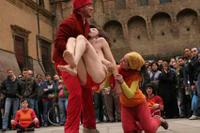 expression, indicating new possibilities and directions.
expression, indicating new possibilities and directions.
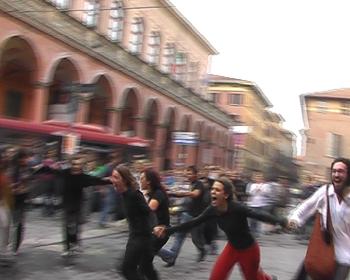
A short preview:
Stop the bombs
We started from an idea best expressed by Julian Beck: Emergency Theatre.
How can we best respond to the calamities that are plaguing humankind? We found also in the impossible text of Antonin Artaud, No More Firmament, a poetic expression of our modern dilemma: the individual in confrontation with a society alienated from its self; and a science at the service of that same Frankenstein-ish structure. Daily life explodes, implodes, upon itself. No More Firmament shows the dissatisfaction of a society in decline, where we feel to be not only victim but also killer, and where the false security of science and the law further exasperates the crisis. But more: with Artaud there is always a beyond, a wish to hope, to fly, to taste the divine. The result is a type of ritualised happening: visions of apocalypse and the getaway plan, where the key to the prison rests in the hope, smiles and participation of the public.
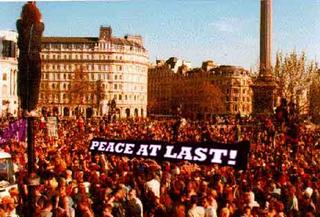 For another nice video, Genova Citta' Aperta (in english), on the issues of G8 and protest (with an interview of myself and others with varying points of view) go to the same site: Arcoiris TV, search Living Theatre
For another nice video, Genova Citta' Aperta (in english), on the issues of G8 and protest (with an interview of myself and others with varying points of view) go to the same site: Arcoiris TV, search Living Theatre
Or, to go directly to the film click: Real Player; Media Player
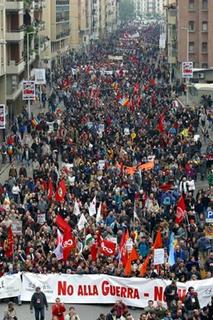



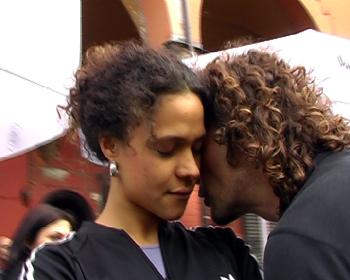
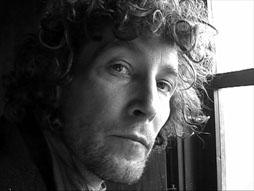


0 Comments:
Post a Comment
<< Home